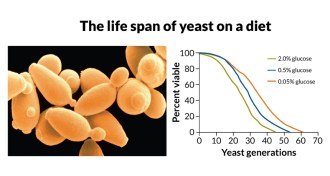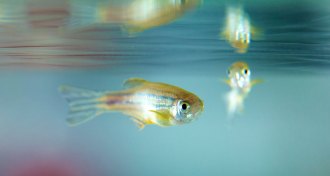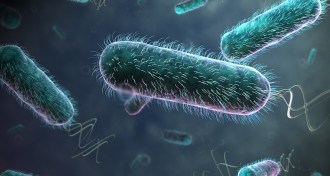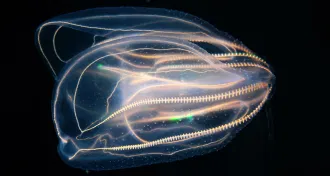Uncategorized
-
 Health & Medicine
Health & MedicinePotential pain treatment’s mechanism deciphered
Scientists have new insight as to how a class of environment-sensing bone marrow cells can help safely relieve pain.
-
 Life
LifeCutting calories lets yeast live longer
A new study confirms yeast live longer on fewer calories.
-
 Science & Society
Science & SocietyHow English became science’s lingua franca
A new book explores the roles of war, politics and economics in the rise of English in scientific communication.
-
 Life
LifeA downy killer wages chemical warfare
The common fungus Beauveria bassiana makes white downy corpses of its victims.
By Beth Mole -
 Genetics
GeneticsMutation-disease link masked in zebrafish
Zebrafish study shows organisms can work around DNA mutations.
-
 Physics
PhysicsSwimming bacteria remove resistance to flow
The collective motion of swimming bacteria can virtually eliminate a water-based solution’s resistance to flow.
By Andrew Grant -
 Tech
TechFlame-finding pistols set off decades of blazing technology
Researchers unveiled a gun-shaped flame detector in 1965
By Beth Mole -
 Plants
PlantsFlowers’ roles considered in ecosystems and economics
In ‘The Reason for Flowers’, a pollination ecologist chronicles the science and culture of blossoms from the dawn of humanity.
By Sid Perkins -
 Planetary Science
Planetary SciencePluto: A timeline of 85 years of discovery
Several observations in the last 85 years have given astronomers a little more information about Pluto, and the July 2015 flyby will offer the closest look yet at the solar system's far-flung satellite.
-
 Physics
PhysicsThe arrow of time
Gravity may explain how time always runs forward, even though the laws of physics should permit it to run backward.
By Andrew Grant -
 Paleontology
PaleontologyAncient comb jellies might have had skeletons
Soft and filmy today, comb jellies might once have had rigid skeletons.
By Susan Milius -
 Anthropology
AnthropologyMonkey’s small brain shows surprising folds
An ancient monkey’s tiny brain developed folds, raising questions about primate evolution.
By Bruce Bower